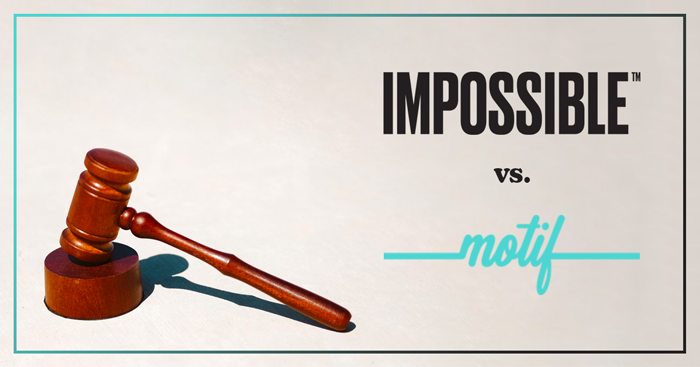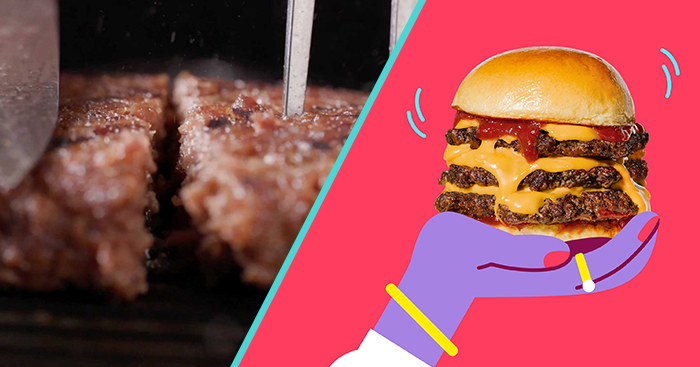What Impact Impossible’s “Infringing Burger” Lawsuit Could Have On Alt-Protein

Last week marked the return of Natural Product Expo West, the annual trade show in which natural CPG brands showcase their newest product innovations and positionings. But behind the excitement and energy of returning to in-person events, a storm has been brewing in the red-hot plant-based meat category: after its first day exhibiting at the show, Motif Foodsworks, a spinoff of Massachusetts-based Gingko Bioworks, was served with a lawsuit claiming that the technology it had just showcased at Expo violated a patent held by one of the nascent category’s leaders, Impossible Foods.
According to a complaint filed in Delaware District Court, Impossible alleges that Motif has willfully and indirectly infringed on at least one of its patents by using a heme-containing protein in “a beef replica product.” Impossible is claiming that not only did Motif know it was violating its patent by creating alternative heme proteins, but that the company also has caused other food manufacturers to “indirectly” violate Impossible’s intellectual property. Motif plans to sell its technology rather than creating finished CPG products and has pilot launched with Dallas restaurant chain Coolgreens in addition to exhibiting finished products for display purposes at numerous trade shows over the past six months, including Expo West.
According to the complaint, heme-containing proteins and the discovery that heme is essential to replicating the taste, aroma, and mouthfeel of animal-derived meat fall under Impossible’s patent-protections. The suit claims that the use of similar ingredients violates the company’s intellectual property as heme is the primary component used to make Impossible’s signature beef products “bleed like meat.”
“We applaud other companies’ efforts to develop compelling plant-based products, but we do not tolerate attempts to undermine our brand or products through the deliberate and unauthorized infringement of our intellectual property,” a spokesperson from Impossible Foods said in a statement.

Impossible’s heme was originally derived from soybean root nodules; in contrast, Motif’s was developed using bovine cells, called HEMAMI, for which it secured GRAS certification in December. In the complaint, Impossible goes on to note its own heme “is not naturally produced in the body of any animal species,” and that in order to commercialize its product it developed a more efficient production method that used a proprietary strain of genetically modified yeast to produce its heme-derivative through fermentation. Motif also uses fermentation technology to produce its HEMAMI ingredient.
“This complaint is not supported by facts or the law and is nothing more than a baseless attempt by Impossible Foods to stifle competition, limit consumer choice, and impede Motif, a new and innovative company with significant business momentum,” a spokesperson for Motif Foodworks said in a statement. “We intend to contest these allegations vigorously and will respond through the appropriate legal channels. We will continue to pursue our go-to-market strategy and work towards our mission to bring better tasting, nutritious and sustainable foods to the world.”
According to Greg Sephton, Ph.D. and partner at Haug Partners specializing in intellectual property, Impossible may need to defend against an allegation that its claims are overly broad relative to the inclusion of heme in a meat replica product. If this occurs and Impossible’s patent is invalidated on this basis, which he notes has happened on numerous occasions over the past several decades, then the case could be used as leverage against Impossible in any future disputes, in addition to opening up the playing field for even more competitive products to enter the alt-protein market.
“You’re only able to patent something, if you’ve properly supported and enabled that technology,” explained Peter Paredes, partner at Amin Talati Wasserman, specializing in IP protections across nutraceutical, food, biotechnology and other industries. “In order for [Impossible] to claim all heme-containing proteins, they would have to use every known, heme-containing protein that currently exists and show that in the patents, otherwise they can’t claim the entire universe of heme-containing proteins.”
Further complicating the litigation process for Impossible is the core aspect of its stated mission – to mitigate the food system’s impact on climate change. According to Paredes, there are two viable approaches that Impossible could take to protect market share and maintain the validity of its mission within the “green space.” Paredes cites Tesla’s early days when Elon Musk expressed that the company welcomed competition by making its technology available through licensing and royalty fees as a possible way out of this dispute for both Impossible and Motif.
However, while that worked for Tesla, which was already a public company at the time, Impossible may need to be more aggressive about how it protects its market share. Paredes said Impossible most likely needs to “carry a bigger stick with their IP” in order to keep its investors happy and protect its valuation “if and when it does go public,” a possibility that began to circulate last month.
Paredes believes this may be why Impossible is taking a “big swing” with this suit, using it as a warning to others in the category about the claims they make in regard to their own products. Throughout the complaint, Impossible’s legal team has pulled commentary from the Motif team published in everything from mass media articles to social media posts as a way of arguing the “willfulness” of the company’s alleged infringement.
“I think it’s gonna cause a refocus for what statements people make on the regulatory side, and also on the business side. [Impossible has] used [Motif’s] website and used social media statements [as examples] of what Motif has alleged. Because impossible is kind of the gold standard currently as it’s so popular, there’s going to be follow-ons and copycats down the road. Impossible is just trying to make a big swing and protect their intellectual property rights, but also let folks know that these are their patents and be careful what you state [about your own products].”
At the time of publication hearings have not been set. Motif’s response to the complaint is due by the end of the month.


















